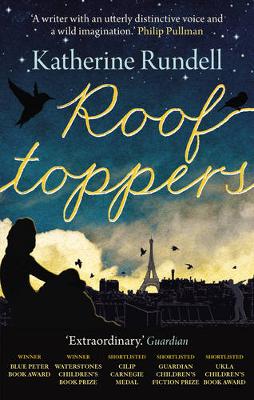Rooftoppers by Katherine Rundell
When I teach writing, I often encourage students to ‘play.’ Sometimes this means, ‘play with new ideas; don’t fix too soon.’ Sometimes I mean, ‘play with your routine; new stories might need new habits.’ Most often what I mean when I say ‘play’ is, ‘play on the page: rearrange sentences, introduce rhetorical devices, use words as if they were Lego.’
One writer who seriously knows how to play is Katherine Rundell. In this Literary Dissection, I’m looking at readers’ first introduction to the joyous effervescence of Rundell’s words with the opening passage of her debut novel, Rooftoppers. It begins:
On the morning of its first birthday, a baby was found floating in a cello case in the middle of the English Channel.
It was the only living thing for miles. Just the baby, and some dining-room chairs, and the tip of a ship disappearing into the ocean. There had been music in the dining hall, and it was music so loud and so good that nobody had noticed the water flooding in over the carpet. The violins went on sawing for some time after the screaming had begun. Sometimes the shriek of a passenger would duet with a High C.
The baby was found wrapped for warmth in the musical score of a Beethoven symphony. It had drifted almost a mile from the ship, and was the last to be rescued. The man who lifted it into the rescue boat was a fellow passenger and a scholar.
The book was published in 2013, which was a period in the UK when shipwrecks in the Channel were not part of the daily news. But, even without me telling you the publication date, it’s still unlikely you would have read this as the opening to a contemporary story about asylum-seeking because of the voice. Rundell uses a traditional and yet also very playful voice.
The ‘traditional’ part comes because of the narrator’s detachment from the story. They aren’t a character, they are an outside observer of the plot. This choice, as you probably know, is the ‘omniscient narrator’ and it belongs to a pedigree that Philip Pullman calls ‘the Classical Tone’. This tradition sees comforting, perceptive adult narrators with the ability to see and understand the span of human experience. Pullman wrote admiringly of Philippa Pearce’s narrator in Tom’s Midnight Garden as an example.
Rundell’s narrator is knowledgeable – they know details like the time of day and the significance of the date; but they are also kind – they tell us straight away that the child was rescued, so we won’t worry.
The narrator is very traditional, but they are also playful, and I want to look at how they play by identifying some of the rhetorical devices used in this passage. It is Christmas-stocking-stuffed-full of them – things like metaphor, parachesis, bathos, puns… a smorgasbord of typewritten treats.
‘On the morning of its first birthday, a baby was found floating in a cello case in the middle of the English Channel.’
We have a half-rhyme with ‘On the morning’; mirrored alliteration with ‘first birthday, a baby was found floating’ and the sibilance of a ‘cello’ in the ‘Channel’. The sentence is fun to read because of these weaved sounds.
‘Just the baby, and some dining-chairs, and the tip of a ship disappearing into the ocean.’
Here we have the camera lens pulling back to move from tiny to enormous – an infant, to some furniture, to a cruise ship. The shift in scale is dizzying.
The narrator follows this with an account of the water flooding the decks, but the tragedy is kept at arms-length by the absurdist detail – the music was so good and so loud no-one noticed the drowning.
‘The violins went on sawing for some time after the screaming had begun. Sometimes the shriek of a passenger would duet with a High C.’
Poor the violins.
But we have more bathos than tragedy from these ill-fated fiddlers, as the narrator takes the time to insult their playing as ‘sawing’. More sibilance comes from this insult as sawing is echoed by the screaming, sometimes shrieking. And the cherry on top is the gorgeous pun dolloped at the end, duet on the high seas/High C.
The Romantic absurdity of this opening scene rounds off with the poor baby wrapped in a Beethoven score, before the omniscient narrator returns to their kindly fact-dispensing, closing with the expository statement that the baby’s rescuer is a fellow passenger and a scholar.
There is movement, musicality and the delicious bells of whistles of elegant rhetorical construction present here on the first page of what goes on to be a brilliant read. If you are looking for ways to play on the page, then Katherine Rundell offers a wonderful exemplar and, I hope, inspiration.
Rooftoppers, 2013, Faber and Faber, London
ISBN: 9780571280599

Wonderful! Why hadn’t I noticed the high sea/high C fun before I read this? Thank you, Ellen.